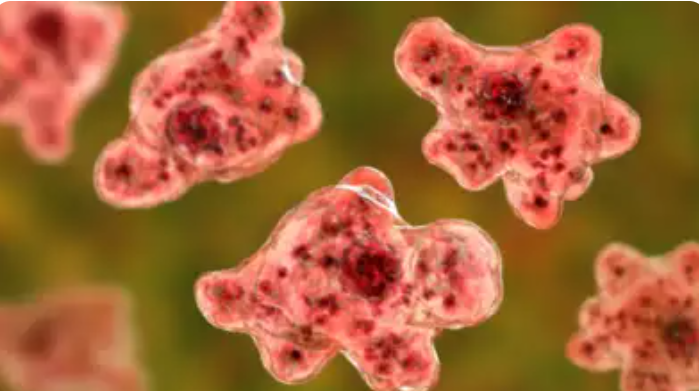Introduction
The tragic death of a five-year-old girl from Moonniyur panchayat in Malappuram district, Kerala, has brought attention to amoebic meningoencephalitis, a rare yet deadly brain infection. This condition, caused by free-living amoebas found in contaminated water, poses significant health risks, particularly in certain environments.
What is Amoebic Meningoencephalitis?
Amoebic meningoencephalitis is a severe infection of the brain and its surrounding membranes. The primary culprits behind this condition are microscopic, single-celled organisms known as amoebas, specifically Naegleria fowleri and Acanthamoeba species. These organisms are typically found in warm freshwater bodies such as lakes, rivers, hot springs, and poorly maintained swimming pools.
Causes of Infection
Infections typically occur when contaminated water enters the body through the nose, allowing the amoeba to travel to the brain. Naegleria fowleri is the most common cause, found in warm freshwater. Acanthamoeba, on the other hand, can be present in various water sources, soil, and even the air. This amoeba can infect individuals through cuts in the skin, the respiratory tract, or misuse of contact lenses.
Symptoms to Watch For
The symptoms of amoebic meningoencephalitis can be divided into early and late stages. Early symptoms usually appear within one to nine days of exposure and include:
- Severe headache
- Fever
- Nausea and vomiting
- Stiff neck
As the infection progresses, more severe symptoms develop, such as:
- Confusion and lack of attention
- Loss of balance
- Seizures
- Hallucinations
- Altered mental status or coma
Case in Kerala
In a recent case from Kerala, a young girl began showing symptoms of fever, headache, and vomiting after taking a bath in a nearby pond on May 1. Despite receiving treatment at the Kozhikode Medical College’s Institute of Maternal and Child Health, she tragically passed away. Other children who bathed in the same pond were observed but found to be free of the infection.
Prevention and Safety Tips
Given the severe and often fatal nature of amoebic meningoencephalitis, it is crucial to take preventive measures, especially in regions where such infections have been reported. Here are some safety tips:
- Avoid Swimming in Warm Freshwater: During hot weather, avoid swimming in warm freshwater bodies like lakes and rivers.
- Use Nose Clips: If swimming in freshwater cannot be avoided, use nose clips to prevent water from entering the nasal passages.
- Ensure Proper Pool Maintenance: Make sure swimming pools are properly maintained and chlorinated.
- Avoid Contact Lens Misuse: Ensure proper hygiene when using contact lenses to prevent infection through the eyes.
Conclusion
Amoebic meningoencephalitis, though rare, is a devastating disease that requires immediate medical attention and preventive measures. Awareness and education about the causes, symptoms, and prevention of this infection are crucial in protecting ourselves and our loved ones from such tragic outcomes. Always consult healthcare professionals if you suspect exposure or experience any symptoms related to this infection.
To register for our next master class, please click here https://linktr.ee/docpreneur




